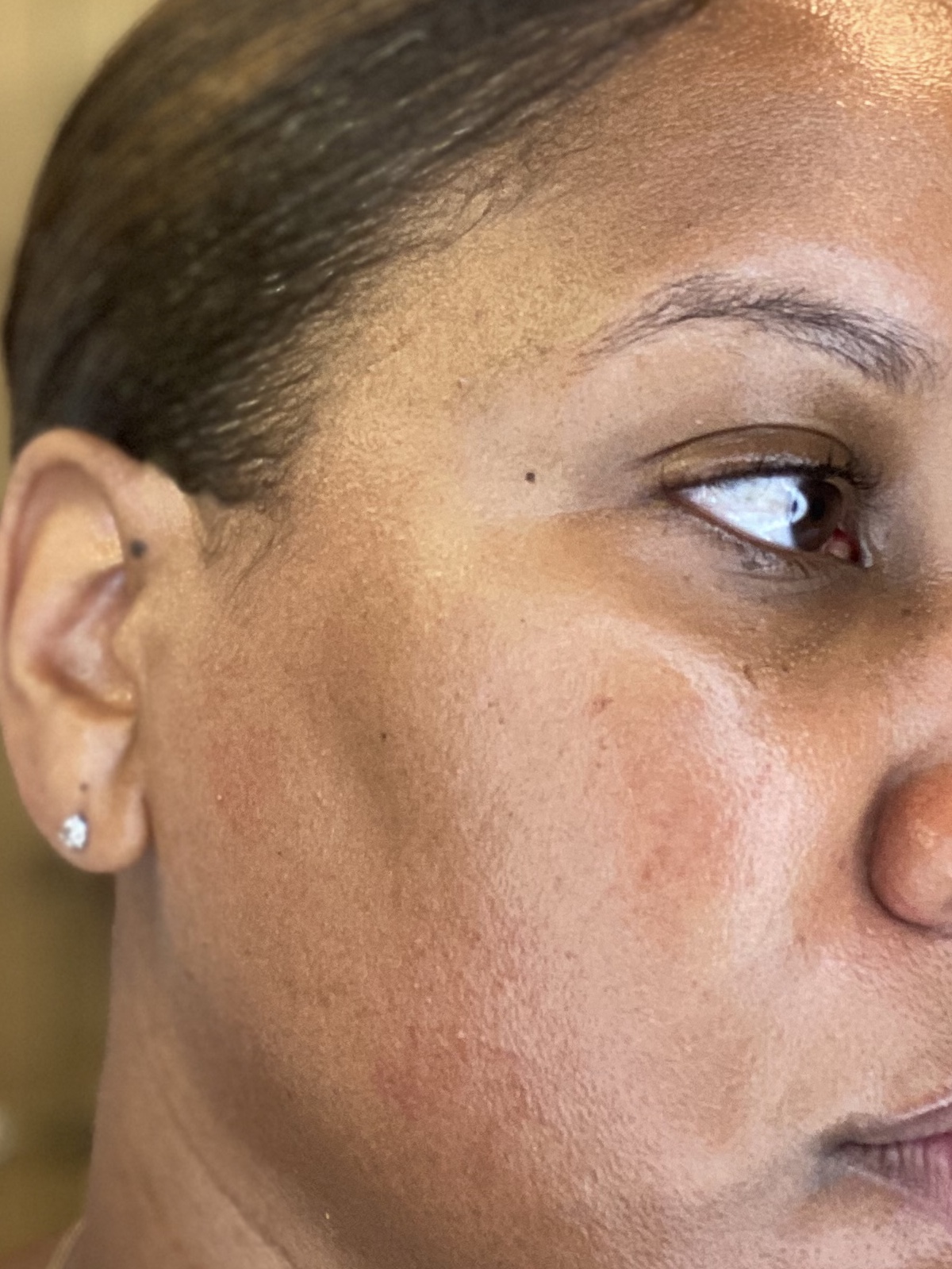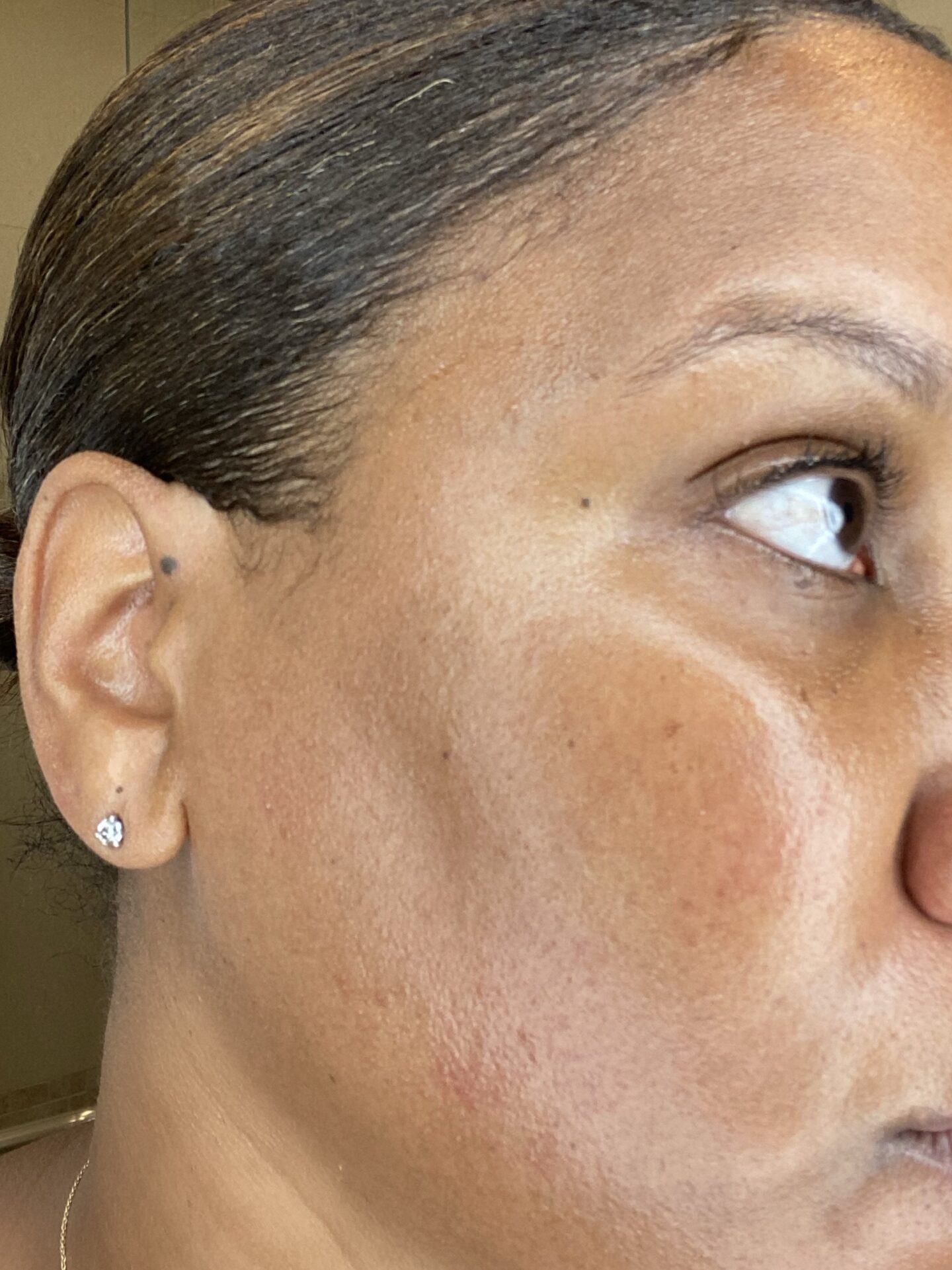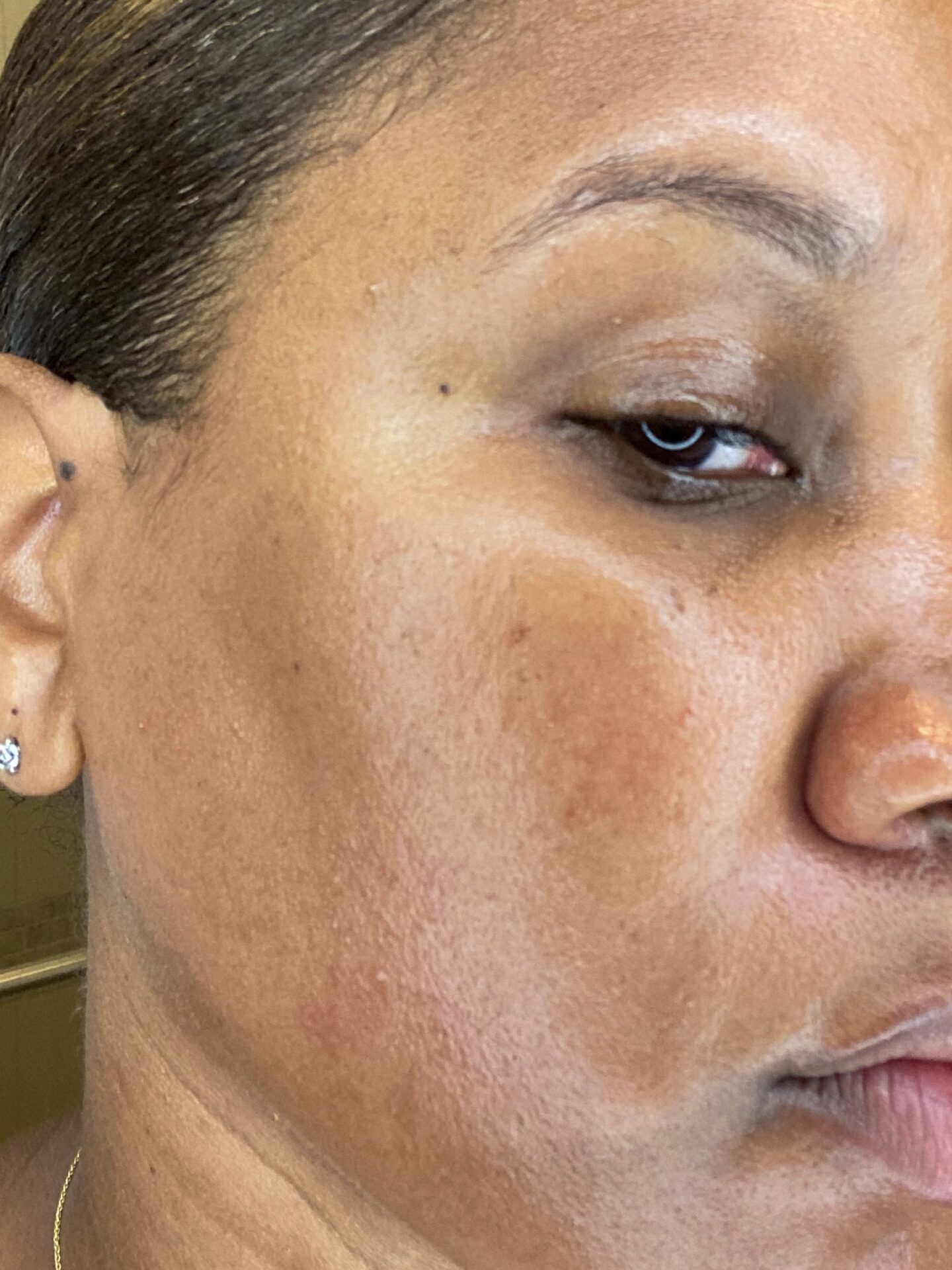In skincare, there are a few core skin types that get thrown around frequently: normal, oily, combination, dry, and sensitive skin.
If you had to characterize your skin type, would “sensitive” come to mind? If so, you’re not alone. According to an article on The Prevalence of Sensitive Skin, approximately 60–70% of women and 50–60% of men report having some degree of sensitive skin.
But how do you know if you have sensitive skin? Are you born with sensitive skin, or can it happen to anyone? And most importantly, what can you do to make your skin less irritated?

This blog post is intended to break it all down. Today, we’ll discuss:
- What sensitive skin is
- The symptoms & most common causes of sensitive skin
- The common irritants people with sensitive skin should avoid
- How to treat sensitive skin
- Products to include in a sensitive skincare routine
Plus, I’ve got a FREE GUIDE for you at the end of this post!
What is Sensitive Skin?
Sensitive skin is a skin type caused by a genetic predisposition. That essentially means that sensitive skin is more easily irritated than most people’s.
Sensitive skin is associated with having a compromised skin barrier, making the skin more sensitive to irritants, allergens, bacteria, and other invaders. A compromised skin barrier also makes it harder for the skin to retain water, leading to chronically dehydrated, dry, and inflamed skin.
This barrier is also essential when it comes to inflammatory skin conditions like:
- Eczema, which manifests itself as an itchy, red rash
- Rosacea, which reveals itself as redness, flushing, and enlarged blood vessels
- Psoriasis, which appears as bumpy, scaly patches
Typically, sensitive skin can manifest with symptoms like:
- Redness
- Tightness
- Stinging/Burning
- Itching
- Dry Patches
- Inflammation
- Soreness
- Rashes
So, What Causes Sensitive Skin?
According to an article in WebMD, the causes of sensitive skin reactions can stem from various skin reactions, including diet, hormones, lack of sleep, stress, and excessive exposure to skin-damaging environmental factors such as sun and wind or extreme heat cold.
What is Sensitized Skin?
Often people see the slightest bit of redness or stinging and automatically assume they have sensitive skin.
According to New York City Board-Certified Dermatologist Dr. Michelle Henry, M.D, “More than 60% of women say their skin is sensitive, but most don’t actually have chronic sensitive skin.”
There is a good chance that your skin it’s not sensitive but sensitized. This treatable and preventable skin condition can be confusing because many of the symptoms are the same as sensitive skin, but the root cause IS different.
⠀⠀⠀⠀⠀⠀⠀⠀⠀
Essentially, sensitized skin is a skin condition anyone with any skin type can experience, all based on the environment, lifestyle, harsh skin care products, and what is going on inside the body.
Factors like smoking, alcohol, poor diet, hormonal fluctuations, and some medications can affect your skin’s sensitivity. Yet, in my research, the most significant contributor to sensitized skin is topical skincare products, overly exfoliating, and particular ingredients.
Common Irritants For Sensitive Skin
Many brands claim to be “dermatologist-tested,” “hypoallergenic,” or marketed toward sensitive skin, but that shouldn’t be enough to earn your trust. As I discussed in my check your skincare ingredients post on Instagram, you need to inspect the ingredients to ensure they measure up!
Here are some common irritants for sensitive skin:
- Synthetic Fragrance
- Essential Oils
- Simple Alcohols
- Sulfates
- Synthetic dyes and colorants
- Exfoliants & Retinoids
Synthetic Fragrance
Did you know that “fragrance” or “parfum” on a label can irritate your skin? Even unscented products can contain fragrance to cover up the smell of ingredients that may have an unpleasant odor.
I suffer from eczema, so I personally avoid fragrance due to my experience with redness and flare-ups using products that include it.
Essential Oils
It’s not just a synthetic fragrance that can irritate. Many essential oils, like citrus, tea tree, mint, and one of my favorites, lavender can cause reactions.
Simple Alcohols
Denatured alcohol, ethanol, isopropyl alcohol, and methanol are too drying for sensitive skin and leave it vulnerable to irritants. If you can’t avoid them altogether, check to make sure they’re not one of the first five ingredients since they make up most of the product. Fatty alcohols, like stearyl, cetyl, and cetearyl alcohol, are non-drying.
Sulfates
Usually found in cleansers and toothpaste, sulfates are foaming agents that strip the skin’s natural oils and can lead to a weakened skin barrier.
Exfoliants & Retinoids
Exfoliants and retinoids are very effective and not irritating when used correctly on healthy skin. But, if your skin is already sensitized, then exfoliants and retinoids can really irritate the skin.
How Do I Know If I Have Sensitive or Sensitized Skin?

Symptoms of Sensitive Skin
- Red or dry patches, a dry skin type or chapped skin
- Certain foods make you flush – alcohol, coffee, or spicy foods.
- Tight, itchy or burning skin
- A tendency to sunburn easily
- Easily irritated by soaps, laundry detergent, perfumes, and essential oils
Symptoms of Sensitized Skin
- Dehydration
- Acne
- Rashy appearance to the skin
- Redness and broken capillaries
- A “sunburn” sensation
- Tightness after washing face
- Skin sensitivity after a weather change or traveling
How Can I Find Out What Irritates Me?
No matter what may be causing your skin sensitivity, your first line of defense should be to go on a skincare diet.
What is a skincare diet, you ask? It’s exactly what it sounds like…a “diet” for your skin.
You temporarily cut down your skincare routine to the essentials: cleansing, moisturizing, and protecting (SPF). This skincare diet is all about giving your skin a chance to recover from its sensitive, irritated state after skincare product overload. Your products should be fragrance-free, soap-free, botanical-free until your reaction clears up.
Once your skin has calmed down, you can re-introduce more products into your routine, one week at a time, and see how your skin feels. That way, you can quickly pinpoint any skincare products that may cause a problem.
What To Include In A Sensitive Skincare Routine
Now that you know what to avoid, let’s talk about what to include in a sensitive skincare routine.
In general, the fewer the products and ingredients, the better because the less stuff you put on the skin, the less it has to react to!
A sensitive skincare routine is set up to repair, heal, soothe, and calm your skin. So, ingredients that retain moisture and replenish the lipid barrier are perfect! Great ingredients are humectants like glycerin and hyaluronic acid and ceramides, and fatty acids like linoleic acids.
CURRENT FAVORITES TO HELP CALM & SOOTHE SENSITIZED SKIN
- Dr. Barbara Sturm Calming Serum
- First Aid Beauty Pharma Arnica Relief & Rescue Mask
- Indeed Labs 10Balm
- Krave Beauty Great Barrier Relief
- NIOD Modulating Glucosides
- Paula’s Choice Omega+ Complex Serum
- Paula’s Choice Omega+ Complex Moisturizer
- SkinFix Eczema+ Dermatitis Face Balm
- Youth To The People Adaptogen Cream
Conclusion & Free Tips
If your skin is sensitized, access my 15 tips to heal sensitized skin by signing up below.
And, if you’re new to building a skincare routine, check out my blog post on How To Build A Skincare Routine first.
Do you consider your skin sensitive?
What has helped your skin the most?


Comments +